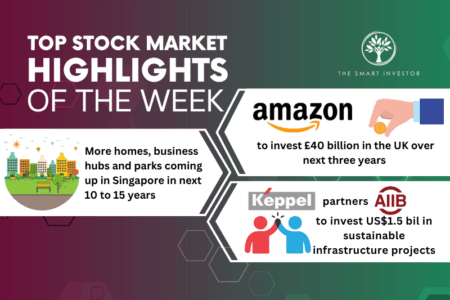Lunar New Year has arrived once again, and this annual festival never fails to remind me of two things – New Year goodies and red packets.
While snacking is a highlight, it’s the familiar red packets children receive that serves as inspiration for this article.
As many of you know, red packets, also known as “hongbao” in Mandarin, come with a gift of money and are handed out to children, family members and friends as a symbol of good fortune.
Naturally, my 13-year-old daughter is a big fan of this festival.
After all, who wouldn’t enjoy collecting unique red packets from relatives and loved ones?
The act of giving made me think hard, though.
Rather than just giving our children red packets every year as per tradition, can we do more for them?
Cultivating a savings habit
Firstly, every child should cultivate a healthy savings habit.
Parents have a responsibility to inculcate good spending habits by being role models themselves, as kids tend to mimic what their parents do, rather than what they say.
Primary school children can be taught the value of money and get into the habit of placing their spare cash into a piggy bank.
The money that is saved can be deposited into a bank account.
Examples include the POSB Kids account I opened for my daughter.
But with inflation hitting close to 14-year highs in Singapore, simply socking money away in a bank account means its purchasing power surely will erode over time.
Never too young to start investing
Speaking of money, financial literacy is an important skill that is not taught in school.
Therefore, the responsibility falls on us, as parents, to impart these skills to our children.
It’s never too young to start investing.
In fact, one of the world’s best investors, Warren Buffett, bought his first stock at age 11!
Now, you may argue that kids are not ready to make their own investment decisions..
It’s a fair point.
But there shouldn’t be anything stopping you from teaching your kids about simple investment concepts and discussing with them on how businesses work.
Start simple by explaining the different investment options out there (e.g. stocks, bonds, real estate) and how each works.
Next, demonstrate what investing is about by showing them a business they are familiar with.
It could be anything from a bubble tea shop such as LiHo and Gong Cha to supermarket operators such as Sheng Siong (SGX: OV8).
From a young age, I’ve been sharing with my daughter on how I park money in stocks and how a stock represents part-ownership in a business.
As these businesses churn out profits, I will be looking to them to share some of the spoils as a dividend.
And if that business becomes more valuable over time as it grows, then its share price will also rise to reflect its business strength.
Parents can do more
Some parents have taken it a step further.
An example is my friend, finance blogger Derek at thefinance.sg.
He started a portfolio for his child in June 2020 with an allocation of 60% to equities and 40% to bonds.
It’s a great idea to open a segregated account for your kid(s) so that you can track the progress of their investments.
And when they reach adulthood and are better prepared to manage their own portfolio, the responsibility can be handed over to them.
This is the perfect gift from a parent to their child.
The knowledge of how to put their money to work and the little pot of cash that has grown over time in their investment account.
The amazing power of compounding
In case you’re wondering whether it’s a good idea to start a stock portfolio for your kid, consider this.
The power of compounding over decades can grow a small investment into a sizable amount.
The results will surprise you.
For example, my daughter was born in June of 2009. Now, if I had bought shares of Apple (NASDAQ: AAPL) for her in July, I would have scooped up shares of the technology company at just US$5 apiece.
Fast forward nearly 14 years later, and Apple has seen its share price multiply by nearly 27 times to its current US$135.
But if you think I am cherry-picking a date that’s so close to the end of the Great Financial Crisis, then let’s take another two examples of stocks purchased and held for over 20 years.
If you bought shares of coffee-chain Starbucks (NASDAQ: SBUX) back in early 2003 and held them for over two decades, your investment would have grown close to 21-fold.
Similarly, buying sports footwear giant Nike (NYSE: NKE) 20 years ago and holding till today would see your money multiply by nearly 23 times.
That’s as good a reason as you can get for buying stocks when your kid is young and then holding them over the long term.
Building a growing stream of pocket money
Let’s not forget that good investments can also pay out increasing levels of dividends over the years.
So, if you continuously invest money into your child’s stock portfolio and buy well-run dividend stocks, you can end up with a significant amount of passive income by the time they hit their teenage years.
REITs come to mind as reliable and consistent dividend payers.
If you had bought 2,000 units of Parkway Life REIT (SGX: C2PU) 10 years ago, you would have forked out S$4,600.
Back then, in 2013, the healthcare REIT paid a distribution per unit (DPU) of S$0.1075, giving your child an annual dividend income of S$215.
Fast forward to today, and those same 2,000 units will now be worth close to S$7,500.
Meanwhile, the dividend your child will receive has jumped to S$281.6 as 2021’s DPU has increased to S$0.1408.
This is just one example and there are many others that pay out significantly higher dividends over time.
The trick, of course, is to get started early.
By giving your child a head start in investing, you can help to grow his or her funds while also generating a sizable passive income stream.
If done well, it could be their pocket money for life, and not just in their schooling years.
So, the next time your children run excitedly to you with their red packet money, think about putting some of it to work.
By harnessing the power of compounding, you’re doing your child a huge favour.
Note: An earlier version of this article appeared in The Business Times.
Not sure where to park your money in 2023? Give dividend stocks a try. You don’t need a lot of capital to start a stream of passive income. Our latest guide will show you how to invest and where to find the juicy dividends in SGX. Click here to download the report for FREE.
Follow us on Facebook and Telegram for the latest investing news and analyses!
Disclaimer: Royston Yang owns shares of Apple, Nike and Starbucks.




